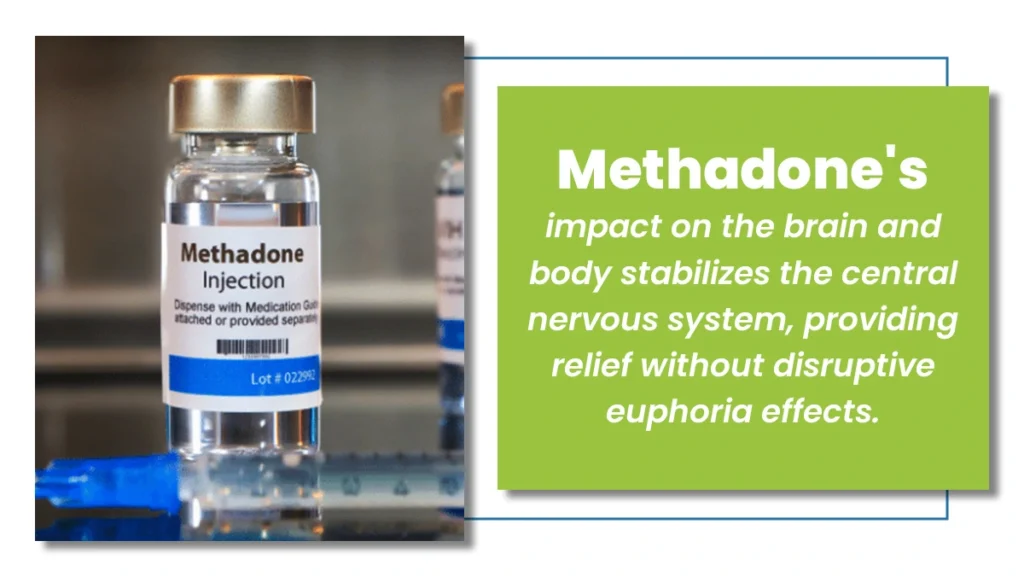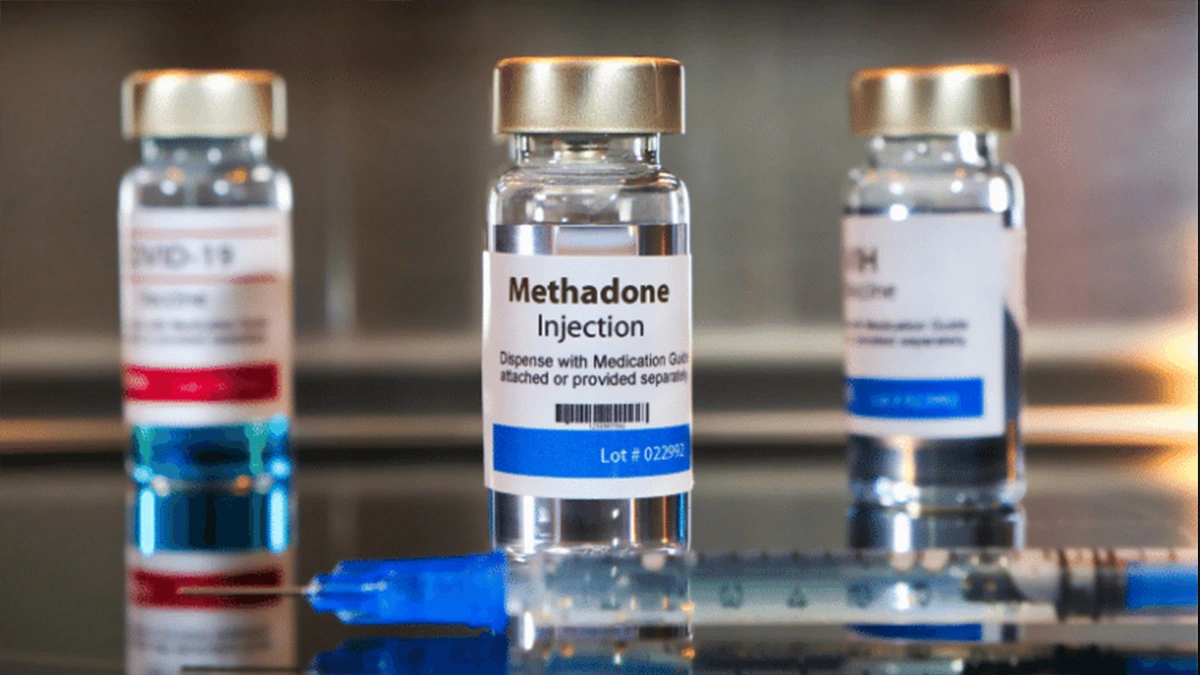Methadone is a medication prescribed by doctors to alleviate severe pain. It targets opioid receptors in the body and is effective in managing withdrawal symptoms and mitigating pain. Besides, doctors may also prescribe methadone to patients who are dealing with opioid use disorder as part of their treatment plan.
Methadone plays a crucial role in medication-assisted treatment, providing essential relief and support to people who are striving to overcome their addiction to opioids. It is vital to learn about the uses and risks of methadone to ensure its safe use.
Key Takeaways
Methadone is prescribed for severe pain and is a crucial component in treating opioid addiction. Here’s what you need to know:
- Methadone is a synthetic opioid and is vital in treating opioid addiction
- Its role in opioid treatment programs, especially in medication-assisted treatment (MAT), offers individuals a gradual path to recovery.
- The medication’s impact on the brain and body stabilizes the central nervous system, providing relief without disruptive euphoria effects.
- While ensuring safe use is crucial, potential risks include side effects, withdrawal symptoms from abrupt changes, and a higher risk of overdose if not used as prescribed.
If facing addiction, The Haven Detox-Little Rock offers comprehensive services. Contact us at (501) 271-3342 today.
Insights Into Methadone Drug Use
Methadone is used to address opioid addiction and plays a vital role in the United States’ efforts to combat the opioid crisis. Methadone comes from the same kind of plant as heroin, the poppy plant.
However, it works differently in the body, and the way it acts is more controlled. Prescribed as part of methadone treatment, it helps individuals manage chronic pain and break free from the clutches of illicit opioid use.
The Biochemical Mechanics of Methadone
Methadone medication operates by binding to the same receptors in the brain that respond to opioids like heroin, providing similar effects without the intense euphoria. This biochemical interaction makes methadone an invaluable tool in methadone maintenance treatment (MMT) programs. Administered in carefully monitored doses under medical supervision, MMT helps individuals gradually reduce opioid dependence.
Crucially, methadone treatment isn’t exclusive to adults; it is also employed for pregnant women with drug dependence, minimizing health risks to both mother and child. Understanding the biochemical nuances of methadone is essential for tailoring treatment programs and ensuring safe and effective outcomes for those striving to overcome opioid addiction.
Working Mechanism of Methadone
Methadone is a synthetic opioid and is vital in treating opioid addiction. It exerts its effects by uniquely influencing the brain and body. Methadone acts on the opioid receptors in the brain but without causing the extreme dizziness and calming effect associated with drug misuse.
Methadone has a long half-life, which means it stays in the body for an extended period. This long action duration helps stabilize neurochemical activity in the brain, providing a steady state of opioid receptor occupancy. This stability helps reduce the fluctuations in mood and physical well-being that often accompany the use of short-acting opioids.
Impact of Methadone on the Brain and Body
Methadone’s impact on the brain is crucial for understanding its role in treatment. In the central nervous system, methadone acts as a stabilizer, offering a similar soothing effect without the disruptive euphoria. The controlled and gradual nature of methadone administration, often under medical care, ensures safety and efficacy in the journey toward overcoming opioid dependence.
Beyond the brain, methadone’s influence on the body extends to mitigating physical discomfort associated with withdrawal, such as nausea, stomach cramps, and headaches. This dual impact on the brain and body positions methadone as a valuable tool in treatment strategies, fostering a path toward recovery and improved well-being for those grappling with opioid addiction.
The Role of Methadone in Chronic Pain
Methadone serves as an essential tool in pain management, especially for long-term relief. A pharmacist prescribes it when other effective treatments may not provide sufficient relief. It helps in minimizing pain and improving the overall quality of life for individuals facing chronic pain.
Therapeutic Benefits
One potential benefit of methadone in pain management is its long-lasting effects. A single dose of methadone can offer prolonged relief, reducing the need for frequent medication adjustments.
This stability in pain control contributes to improved daily functioning. Additionally, methadone can help curb drug cravings for more potent pain medications, offering a balanced and controlled approach to pain relief.
Potential Risks to Health
However, like any medication, methadone comes with potential risks. It may cause possible side effects such as a runny nose, respiratory depression, and impact reaction time. It’s crucial to seek medical help if any unusual reactions occur.
Abruptly changing the dose of methadone or a missed dose can lead to complications, stressing the importance of following medical advice and information provided by healthcare professionals. Understanding the benefits and risks allows individuals to make informed decisions about pain management programs.

Methadone for Addiction Treatment
Methadone tablets are a helpful drug in the United States for treating opiate addictions. It’s often used in medication-assisted treatment (MAT) as it eases the challenges that come with opioid dependence. When taken in carefully managed doses, methadone helps people gradually reduce their reliance on stronger opioids, promoting recovery.
Benefits of Methadone During Recovery
Methadone therapy during a residential program, when supervised by healthcare professionals, minimizes opioid cravings and provides stability.
Its significance lies in providing a stable foundation for individuals striving to overcome opioid addiction. Methadone treatment is considered a harm-reduction strategy. It helps individuals stabilize their lives, reduces the risk of overdose, and lowers the likelihood of engaging in high-risk behaviors associated with drug use.
Risks of Misusing Methadone
Yet, similar to any medication, methadone comes with inherent risks. Taking higher doses or abruptly discontinuing methadone can lead to serious withdrawal effects. There is a risk of overdose if not used as prescribed.
Striking a balance between effective treatment and potential risks requires consistent follow-up with healthcare providers and pharmacists. Additionally, methadone maintenance therapy demands careful management to avoid potential problems and ensure the safe use of this opioid medicine.
Dosage and Administration of Methadone
Methadone, a medication helping during opioid addiction treatment, comes in different forms and dosages to cater to individual needs. The prescribing process ensures safe use.
Drug Forms and Dosages
Methadone is commonly available in liquid and tablet forms, making it flexible for varied preferences. The medication dosages vary, and doctors carefully determine the right amount for each person based on factors like their health and response to the medication. Beginnings with smaller doses, alterations are made gradually to strike the right balance between effectiveness and safety.
Prescribing Process
The prescribing process involves detailed discussions between the healthcare provider and the individual. Patient history, current health, and other medications are considered to create a tailored plan. This careful approach ensures that methadone is both effective in managing addiction and safe for the individual’s overall well-being.
Safe Use of Methadone
Safe use is crucial. Taking methadone exactly as prescribed is key. Skipping doses or taking extra amounts can lead to problems.
Regular check-ins with healthcare providers help monitor progress and address any concerns. Open communication about any side effects or changes in health ensures a safe and effective methadone treatment journey, supporting individuals on the path to recovery.
Impact of Methadone Usage
Methadone, a valuable drug for treating heroin addiction and specific prescription drug dependencies, comes with potential side effects and risks that individuals and their healthcare providers should be aware of.
Common Side Effects
Like any medicine, methadone may cause common side effects such as drowsiness or constipation. These are usually temporary and fade as the body adjusts to the medication. Individuals must communicate openly with their healthcare providers about any side effects experienced.
Withdrawals from Methadone
Unexpectedly stopping or changing the dosage of methadone can lead to opiate withdrawal symptoms such as dizziness and body discomfort. That underlines the importance of gradual adjustments under the guidance of healthcare professionals. These adjustments aim to find the right balance between managing addiction and minimizing potential discomfort.
Signs and Dangers of Methadone Overdose
While methadone can be a beneficial part of treatment, there is a risk of addiction requiring methadone treatment. Signs of overdose include difficulty breathing, extreme drowsiness, and heart rhythm problems. Immediate medical attention is crucial if an overdose is suspected, as it can lead to life-threatening withdrawal symptoms.
The Medical Benefits of Methadone Treatment
Methadone dose, when used medically, can be a valuable aid in addressing opioid dependence. It’s often a key player in opioid treatment programs, providing a controlled and gradual path to recovery.
One significant advantage is its long half-life, which means it stays in the body for an extended time. This property is beneficial in preventing the intense highs and lows associated with short-acting opioids. Even if a dose is missed, the long-acting nature helps maintain stability, reducing the risk of withdrawal symptoms.
Pharmacists play a crucial role in ensuring the safe use of methadone. Their guidance on proper administration and potential interactions with other medications is vital for individuals in recovery.
When Is the Time To Seek Help
Recognizing when to seek help is crucial for your well-being. If you’re experiencing persistent physical discomfort, unusual changes in mental health, or challenges in your relationships, it’s time to reach out.
Seeking assistance is essential when facing addiction, whether to substances or harmful behaviors. If thoughts of self-harm or suicide arise, immediate help is necessary. Significant life changes, financial struggles, and overwhelming stress also warrant seeking support. Remember, seeking help is a sign of strength.
Frequently Asked Questions (FAQ)
Methadone is prescribed to help individuals facing challenges with opioid addiction. It’s an important part of treatment plans, offering a controlled and gradual pathway to recovery. By acting on the same receptors as opioids but in a safer way, it helps manage cravings and withdrawal symptoms, supporting individuals in breaking the cycle of addiction.
Methadone is a medication used in the treatment of opioid addiction. It comes in different forms, like liquid or tablets, and works by affecting the same receptors in the brain that respond to opioids like heroin. Its unique property lies in providing similar effects without the intense euphoria, making it valuable in managing addiction more safely.
Methadone is used to treat opioid addiction effectively. It helps individuals gradually reduce their dependence on more potent opioids by providing a stable and controlled substitute.
This medication, administered in carefully managed doses, minimizes the risk of overdose and withdrawal symptoms. It plays a crucial role in supporting individuals on the path to recovery, offering a safer and more controlled approach to overcoming opioid addiction.
Break the Cycle of Meth of Addiction With The Haven Detox-Little Rock
If you or someone you love is struggling with methadone or other drug addiction and needs help achieving a stable life, The Haven Detox-Little Rock is here to support your journey toward recovery.
Our dedicated team offers various services tailored to your unique needs, including a detox program that is expertly crafted to give a solid foundation to your journey. The residential program provides a supportive, home-like environment for healing, ensuring a practical, holistic recovery experience.It is time to break free from the cycle of meth addiction. Contact us at (501) 271-3342 today to learn more about our services.




